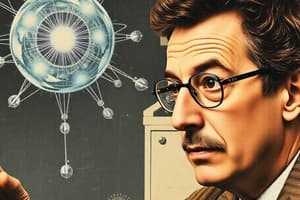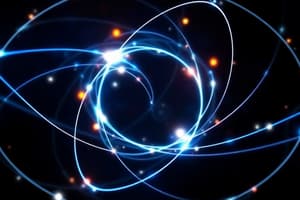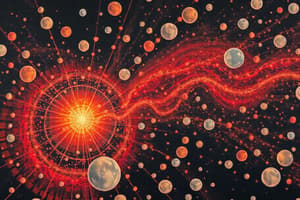Podcast
Questions and Answers
What was one of the primary contributions of Feynman to quantum electrodynamics (QED)?
What was one of the primary contributions of Feynman to quantum electrodynamics (QED)?
- Explaining the phenomenon of gravity
- Developing the theory of general relativity
- Introducing Feynman diagrams (correct)
- Formulating the laws of thermodynamics
Which aspect of Feynman's work relates to the movement of particles in QED?
Which aspect of Feynman's work relates to the movement of particles in QED?
- Particles do not move at all in quantum mechanics.
- Particles can only move forward in time.
- Particles are limited to one-dimensional movement only.
- Feynman diagrams depict particles moving both forward and backward in time. (correct)
In which area did Feynman propose the theory of 'partons'?
In which area did Feynman propose the theory of 'partons'?
- Nanotechnology (correct)
- Quantum Computing
- Astrophysics
- General Relativity
How did Feynman demonstrate the cause of the Challenger disaster?
How did Feynman demonstrate the cause of the Challenger disaster?
What characteristic of superfluid helium did Feynman explain?
What characteristic of superfluid helium did Feynman explain?
What are the two primary categories of particles distinguished by Gell-Mann?
What are the two primary categories of particles distinguished by Gell-Mann?
Which concept introduced by Gell-Mann is now a fundamental part of particle physics?
Which concept introduced by Gell-Mann is now a fundamental part of particle physics?
In which year did Gell-Mann propose his model for classifying subatomic particles?
In which year did Gell-Mann propose his model for classifying subatomic particles?
What type of particle are quarks classified as according to Gell-Mann's model?
What type of particle are quarks classified as according to Gell-Mann's model?
What award did Gell-Mann receive for his contributions to physics?
What award did Gell-Mann receive for his contributions to physics?
What significant contribution did Richard Feynman make to the field of quantum electrodynamics?
What significant contribution did Richard Feynman make to the field of quantum electrodynamics?
During which project did Feynman conduct bomb research for the Allied forces?
During which project did Feynman conduct bomb research for the Allied forces?
Which of the following awards did Richard Feynman receive for his contributions to physics?
Which of the following awards did Richard Feynman receive for his contributions to physics?
What was Feynman's educational journey before obtaining his PhD?
What was Feynman's educational journey before obtaining his PhD?
What was noteworthy about Richard Feynman's early life?
What was noteworthy about Richard Feynman's early life?
Feynman published a popular textbook in 1964. What was its title?
Feynman published a popular textbook in 1964. What was its title?
What did Richard Feynman achieve in 1965?
What did Richard Feynman achieve in 1965?
What are the structures depicted in the image likely associated with?
What are the structures depicted in the image likely associated with?
Flashcards are hidden until you start studying
Study Notes
Richard Feynman
- Richard Feynman was a renowned physicist and teacher known for his captivating teaching style
- Feynman’s work transformed physics and technology
- He was a key contributor to the Manhattan Project, a crucial wartime initiative
- He worked in the field of quantum electrodynamics (QED), meticulously examining the interactions of charged particles
Feynman’s Career Highlights
- Appointed a junior physicist at the Los Alamos Laboratory for the Manhattan Project in 1943
- Became a professor of theoretical physics at Caltech in 1950
- Won the Albert Einstein Award in 1954
- Published Feynman Lectures on Physics in 1964
- Received the Nobel Prize in Physics in 1965
Early Life
- Born in New York to Lithuanian Jewish parents
- Developed a talent for math and working with gadgets as a child
- Excelled at mathematics in high school and experimented with his own math theories
- Denied admission to Columbia University due to a Jewish quota, he attended MIT
- He earned a perfect score on the physics entrance exams for Princeton and received his PhD in quantum mechanics in 1942
The Manhattan Project
- Feynman agreed to participate in the project, working on bomb research for the Allied nuclear-weapons program
- He was driven by concerns about a Nazi victory
Quantum Electrodynamics (QED)
- Appointed professor of theoretical physics at Cornell University, Feynman began his research on QED
- He examined the interactions of electromagnetically charged particles through the exchange of photons
- Feynman’s work was groundbreaking and remains a foundation in modern physics
Feynman’s Insights into Quantum Mechanics
- Feynman famously said, "I think I can safely say that nobody understands quantum mechanics.”
- He introduced Feynman diagrams to represent particles moving through time and space, visualizing complex quantum equations
- He described QED as a “strange theory”, as many workings of the universe are not intuitively obvious
- Feynman diagrams are used in various applications, such as particle accelerators like the Large Hadron Collider
Feynman's Influence in Other Fields
- Feynman’s contributions extended beyond QED
- He proposed the theory of “partons” which would later be called “quarks"
- He worked on explaining superfluidity, the frictionless flow of helium at near absolute zero
The Challenger Disaster
- He investigated the disaster in 1986 and famously used a glass of ice water and a rubber band to demonstrate how O-rings in the rocket boosters failed
Nanotechnology and Quantum Computing
- Feynman theorized about future quantum computing
Murray Gell-Mann
- A theoretical physicist who made important contributions to understanding subatomic particles
- In 1964, he proposed a model for classifying subatomic particles
- He categorized two main particle types: fermions (building blocks of matter) and bosons (force carriers)
- Gell-Mann proposed the existence of “quarks”, fundamental units combining to form protons and neutrons
- Years later, experiments confirmed the existence of quarks
- His work led to the "Standard Model" and he received the Nobel Prize in Physics in 1969
Feynman Diagrams
- A visual representation of abstract physics concepts, often referred to as “charming squiggles”
- Feynman's use of diagrams is also apparent on his RV
Feynman's Lectures
- Feynman's physics lectures at Caltech were compiled into a well-known textbook
Studying That Suits You
Use AI to generate personalized quizzes and flashcards to suit your learning preferences.





